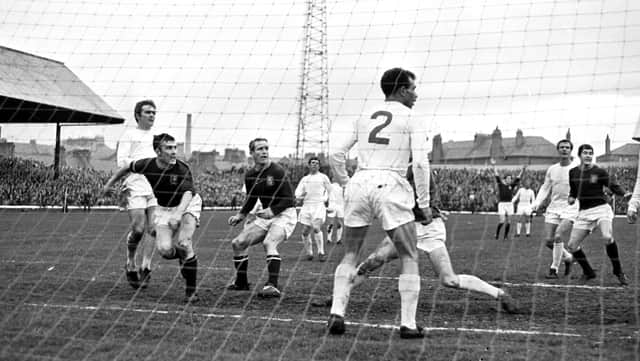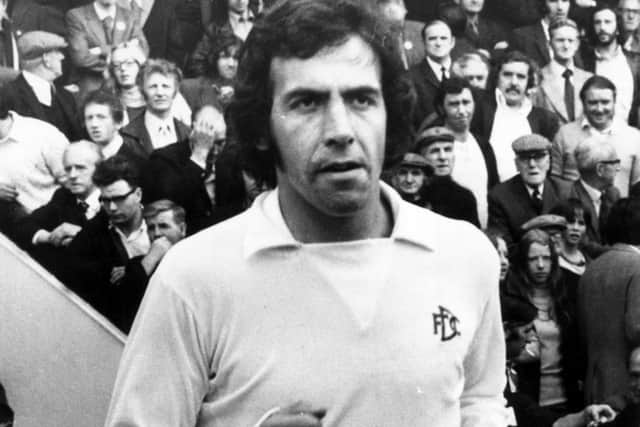When Jim McLean played for Dundee in ‘forgotten’ Euro semi v Leeds


In May 1968, only three titles eluded British football teams: the European Nations’ Cup, which remains elusive, the world club championship title – with Celtic having emerged bruised, battered and beaten from the Battle of Montevideo v River Plate a few months earlier – and the Inter-Cities’ Fairs Cup.
There was every chance that a British side would win the last of these competitions mentioned before very long. Indeed, one was guaranteed to reach the final that very season after Dundee were paired with Leeds United in what has now become something of a forgotten semi-final, the second leg of which was 52 years ago today. Even among Dundee fans it’s the less well remembered of two European semi-finals contested by the Dens Park side in the space of five years in the 1960s.
Advertisement
Hide AdAdvertisement
Hide AdFocus is invariably and understandably placed on their attempt to become the first British club to lift the European Cup in 1962-63. Hopes of achieving this status-changing feat were undone in a single half in San Siro. After holding AC Milan 1-1 at the break, Dundee lost four second-half goals. Although they defeated the Italian champions 1-0 at Dens Park, they had fallen frustratingly short of the Wembley-hosted final, where AC Milan triumphed over Benfica.


Five years on, it was not about Robertson, Penman and Alan Gilzean, and those other great names that roll from Hector Nicol’s tongue in the song Up wi’ the Bonnets. It was the turn of Houston, Murray and… Jim McLean?
The future Dundee United manager would of course lead the club from the other side of the road to the last four of the European Cup – and to the final of the Uefa Cup, which is what the Fairs Cup eventually became before evolving once more into the Europa League. In the dark blue of Dundee he was an important if unflashy, and not always appreciated, contributor to the side’s run, scoring twice in the 3-0 first round win over DWS Amsterdam at Dens Park. McLean played more games than any of his teammates that season, including the 5-3 defeat in the League Cup final to Celtic – where he also scored.
Jim McLean... of Dundee
“He was tidy on the ball,” remembers Jocky Scott now, a substitute in the first leg v Leeds at Dens. “He was a decent passer. He used to try and run with the ball at times, but he was not quick. Wee Jim was one of those players who you might appreciate more as a player playing alongside him rather than as a supporter.”
Dundee were still boasting an unbeaten home record in Europe stretching back eight ties to 1962 when Leeds came calling. A 4-1 win in Belgium over Royal Liege in the second round – in which former Rangers striker George McLean scored all four goals – demonstrated that they could be commanding away from home at times too. A bye in the third round meant home and away victories over FC Zurich, who had already eliminated Barcelona, Nottingham Forest and Sporting Lisbon, secured Dundee’s place in the last four, the draw for which was made a few days before it was known which of Rangers or Leeds would progress from their quarter-final contest after a goalless first leg at Ibrox.
Leeds manager Don Revie was in Birmingham accompanying his goalkeeper Gary Sprake to an FA disciplinary commission when he heard news of the draw. According to reports, he clapped his hands and remarked with a smile: “we’ve done it again!” Dundee were the third Scottish side in a row Leeds had faced. As well as Rangers, they had dispensed with Hibs 2-1 on aggregate in the third round. “It is a very good draw for us,” said Revie. “They are the third Scottish side we have been drawn against. I am very pleased.”
The manager’s thinly disguised satisfaction might have resulted from a quick glance at the Scottish First Division table. An inconsistent Dundee were sitting in mid-table at the time. “If we cannot beat Dundee then we do not deserve a place in the final of the Fairs Cup,” Revie added.
Rangers tie marred by bottle throwing
Leeds still had work to do in order to even get the opportunity to meet Bobby Ancell’s mercurial Dundee team. Their second leg with Rangers was marred by bottle throwing – the visitors’ skipper John Greig was asked by the referee to appeal for calm among the away fans on a feisty night. With over 40,000 watching on large television screens back at Ibrox, Rangers fell 2-0. There was to be no Scottish shootout for a place in the final. But Leeds were the nearest thing to Scottish opponents as far as Dundee were concerned.
Advertisement
Hide AdAdvertisement
Hide AdOne of their number, Peter Lorimer, had even grown up in Broughty Ferry. Eddie Gray, meanwhile, played in the same Scottish schools’ side as Jocky Scott, Dundee’s emerging forward. And then, of course, there was Billy Bremner, a prominent figure in both legs.
“The Leeds machine has begun to show signs of running down after 61 matches in four tough competitions,” wrote the distinguished football writer Geoffrey Green in the Times on the day of the first leg. Indeed, he ventured to suggest that this could be Dundee’s chance to take a first-leg lead. Leeds had lost three of their last six matches – two in succession the previous week.
“Dundee are said to be an expressive side, a team allowed to play “off the cuff” by a manager, Mr Bobby Ancell, who remains something of an anachronism – a romantic in an age of hard professional method,” continued Green.
That was certainly not ever said of Revie, who was a proponent of the “hard professional method” to which Green refers. The approach created enemies but suited Leeds well. While it’s less well chronicled in Dundee’s annals, the semi-final is considered a pivotal step amidst Leeds United’s glory years. Weeks earlier they had won the League Cup, the first trophy of the Revie era, with a 1-0 win over Arsenal.
“It was the start of the rise to prominence for Leeds,” says Eddie Gray, in a conversation with The Scotsman this week. “Winning the Fairs Cup on the back of the League Cup was the start of the breakthrough for Leeds. It was always going to be a tough game for Dundee. It meant a lot to Peter, coming from Broughty Ferry. I knew he enjoyed going back up to Dundee to see a few old friends. I am not saying he was more motivated than the rest of us but he didn’t want to go back to Broughty Ferry having got beaten at Dens! For all the Scottish boys at Leeds it meant a lot.”
‘Which ground do we go to?’
Gray remembers Dundee being physically inferior, as most teams tended to be when up against Leeds – the late Norman Hunter et al. “We turned up and it was a bit strange for the English boys to see two parks across the road from each other – they were like: ‘which ground do we go into?!’” says Gray, who, although he never played league football in Scotland, had been to Dens to support Celtic in his youth.
Leeds made a good start when the versatile Paul Madeley, who replaced the injured Mick Jones up front, opened the scoring with a header from a Bremner cross. “The Dundee crowd saw the polished Bremner and not the militant Bremner,” wrote the Aberdeen Press & Journal. Dundee equalised ten minutes later through Bobby Wilson’s header.
The Times’ correspondent compared the game unfavourably to a Scottish league clash. “After the excitement of the Dunfermline Athletic-Celtic clash the previous night, this was a drab match,” wrote John Downie. Remarkably, he was given reason to add: “The home supporters confirmed the fact by leaving in their hundreds before the final whistle.”
Advertisement
Hide AdAdvertisement
Hide AdSome Dundee fans had clearly been spoiled by the success of the previous years and the promise – perhaps – of more to come. European semi-final or not, they’d seen enough of these Leeds spoilers, who were more than happy to settle for a draw. “[Ally] Donaldson did not have a save to a single shot during the second half,” noted Downie with reference to the Dundee keeper.
Renovation work on the old Spion Kop terracing end at Elland Road meant only three quarters of the ground were in action for the second leg, which restricted the crowd to around 23,000 (about half the normal capacity). “It felt eerie, like a reserve game,” recalls sportswriter Patrick Barclay. Based in Manchester at the time, he travelled the short distance to support his boyhood team but while they showed glimpses of their attacking capabilities, they were never really in it. The crucial away goal never came even with the 20-year-old Scott restored to the line-up. It was a chance to reunite with Gray, his old pal from the Scottish schoolboys’ side five years earlier. Indeed, Scott might well have joined Gray at Leeds United. “I got an invite to go down as well,” he recalls now. “I chose to go to Chelsea in the end.” Gray, three days younger than Scott, scored the goal that settled things nine minutes before the end after Donaldson failed to gather a Jimmy Greenhoff corner.
“It wasn’t the best goal, but it was important to get to the final,” says Gray. Leeds’ achievement in reaching a second successive Fairs Cup final – they had beaten Kilmarnock in the semi-finals 12 months earlier en route to losing to Dynamo Zagreb – was slightly overshadowed.
On the very same night, rivals Manchester United finally reached the European Cup final with a 3-3 draw against Real Madrid. Sir Matt Busby’s side would go on to win the trophy for the first time a fortnight later against Benfica at Wembley. Leeds had to hang on until the following season to play their own final, with Uefa postponing the match due to fixture congestion. Leeds dealt with the extended spell of anticipation to beat Ferencvaros 1-0.
Dundee, meanwhile, ended the season in ninth, sandwiched between Clyde and Partick Thistle. As surviving fans from the hundreds who walked out early from Dens Park that night might note a little grimly, Dundee’s wait for another chance to sample the last-four stage of a European competition goes on.
A message from the Editor:
Thank you for reading this story on our website. While I have your attention, I also have an important request to make of you.
With the coronavirus lockdown having a major impact on many of our advertisers - and consequently the revenue we receive - we are more reliant than ever on you taking out a digital subscription.
Subscribe to scotsman.com and enjoy unlimited access to Scottish news and information online and on our app. With a digital subscription, you can read more than 5 articles, see fewer ads, enjoy faster load times, and get access to exclusive newsletters and content. Visit https://www.scotsman.com/subscriptions now to sign up.
Advertisement
Hide AdAdvertisement
Hide AdOur journalism costs money and we rely on advertising, print and digital revenues to help to support them. By supporting us, we are able to support you in providing trusted, fact-checked content for this website.
Joy Yates
Editorial Director
Comments
Want to join the conversation? Please or to comment on this article.